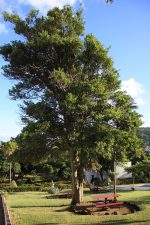The Hebrew word אזרח (ereh) has been translated in various ways but actually means native born, i.e. a tree not transplanted, but growing on its native soil. Some authors assumed that a native tree would grow luxuriantly and translated the word in such a way. On the other hand, the bay laurel (Laurus nobilis) is native to Palestine and and cedar of Lebanon was well known and mentioned by name several times in the Bible so either was a possble translation of the general term אזרח (ereh) in this place. The trees are different in many ways.
 Also known as sweet bay, this aromatic evergreen tree is native to the Mediterranean region. It grows up to 6-‘ in the wild but 5’ in a pot and have glossy, thick, leathery, dark green leaves that are 2-4″ long and elliptical to oval. Clusters of small male and female yellow flowers appear in spring on different trees and are followed by shiny black or purple berries on polinated female plants. The leaves are used fresh or dried as a culinary herb. The genus name, Laurus, is the ancient Latin name for the plant. The specific epithet, nobilis, is the Latin word meaning excellent or noble.
Also known as sweet bay, this aromatic evergreen tree is native to the Mediterranean region. It grows up to 6-‘ in the wild but 5’ in a pot and have glossy, thick, leathery, dark green leaves that are 2-4″ long and elliptical to oval. Clusters of small male and female yellow flowers appear in spring on different trees and are followed by shiny black or purple berries on polinated female plants. The leaves are used fresh or dried as a culinary herb. The genus name, Laurus, is the ancient Latin name for the plant. The specific epithet, nobilis, is the Latin word meaning excellent or noble.
 Cedar of Lebanon is an evergreen tree native to the eastern Mediterranean basin. It grows up to 100′ tall and has a beautiful sculptural form with a thick trunk that can be over eight feet in diameter and a cone-shaped crown that broads and becomes tiered with age. The grayish-brown bark develops fissures as it matures. The horizontal branches are of two types: long ones that form the framework of the tree, and short ones that bear most of the leaves and cones. The dark green to bluish green leaves are 1.5-2.5 inches long and borne spirally on the long stems but in clusters of fifteen to forty-five on the short stems. The upright cones grow singly at the tips of the short branches with the grayish-green cylindrical male cones reaching 1.2 to 2 inches in length and the roundish female cones 2-5 inches in length. The female cones are at first green but become brown as they mature and release their winged seeds twelve months after pollination.
Cedar of Lebanon is an evergreen tree native to the eastern Mediterranean basin. It grows up to 100′ tall and has a beautiful sculptural form with a thick trunk that can be over eight feet in diameter and a cone-shaped crown that broads and becomes tiered with age. The grayish-brown bark develops fissures as it matures. The horizontal branches are of two types: long ones that form the framework of the tree, and short ones that bear most of the leaves and cones. The dark green to bluish green leaves are 1.5-2.5 inches long and borne spirally on the long stems but in clusters of fifteen to forty-five on the short stems. The upright cones grow singly at the tips of the short branches with the grayish-green cylindrical male cones reaching 1.2 to 2 inches in length and the roundish female cones 2-5 inches in length. The female cones are at first green but become brown as they mature and release their winged seeds twelve months after pollination.
Psalm 37.35 David continues to give his insight into the problem of evil; why the wicked prosper and the good suffer.
NIV
“I have seen a wicked and ruthless man flourishing like a luxuriant native tree,”
GNT
” I once knew someone wicked who was a tyrant; he towered over everyone like a cedar of Lebanon;”
ESV
” I have seen a wicked, ruthless man, spreading himself like a green laurel tree.”
KJV
“I have seen the wicked in great power, and spreading himself like a green bay tree”
Bay trees like full sun to part shade in fertile medium moist to dry , well-drained soil in USDA zones 8-10. Propagation is by semi-hardwood cutting, layering, and seed but are difficult by seed. Trees are susceptible to scale, bay sucker (Trioza alacris), and mildew. The genus name, Laurus, is the ancient Latin name for the plant. The specific epithet, nobilis, is the Latin word meaning excellent or noble.
Cedar of Lebanon like full sun and average, medium moist, well-drained soil in USDA Hardiness zones 7-9. They are generally healthy but are susceptable to aphids. Propagation is by semi-hardwood cuttings or seed but seedlings do not transplant well and small ones between 18-24” tall should be selected for planting. The genus name, Cedrus, is the ancient Latin name for the genus. The specific epithet, Libani, honors Lebanon one of the native regions of the tree.